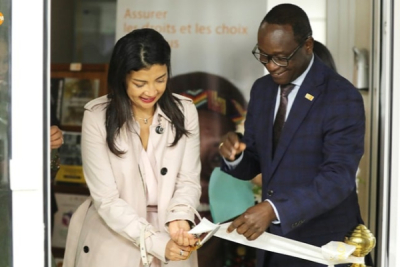With the improvement in internet access, the rise in smartphone adoption, the drop in the costs of sensors, the development of the cloud, etc… Africa has the opportunity to become a real player in the development of the internet of things. In that context, Nigeria is upping its investments in the sector.
E-Space, a global satellite communications company, announced, Monday, it has secured landing rights in Nigeria for its upcoming constellation of low-orbit satellites.
The approval issued by the Nigerian Communications Commission gives E-Space the right to deploy its satellite system, which will "provide communications services and connect Internet of Things (IoT) devices throughout Nigeria in many of the hardest-to-reach parts of the country, particularly those areas currently unserved by terrestrial providers."
Nigeria is among the many nations that are leveraging the Internet of Things to address a wide variety of national challenges while implementing solutions to grow their economy. In 2018, U.S. giant IBM and agritech company Hello Tractor, which has a presence in Nigeria and Kenya, partnered to develop an AI and blockchain platform for African farmers. The partnership has enabled the installation of connected objects equipped with sensors in farms to collect and transmit data on rainfall, plant predators, input use, etc.
The landing right opens a new era in the field and paves the way for future collaboration between E-Space and the country's government, businesses, and communities. The collaboration can lead to the development of the ecosystem and applications needed to develop the local economy and create new jobs in a range of fields, including engineering, and data analysis.
After its launch in 2017, the insuretech company struggled to gain ground in the South African market until 2021 when it suddenly grew by 200% in the first semester.
Pineapple is an insurtech solution developed by a South African eponymous startup. It allows users to purchase insurance policies online
On its web and mobile (Android and iOS apps) platforms, the solution offers a multitude of insurance policies users can buy after they set up their Pineapple accounts. Among others, Pineapple offers insurance for cars, bikes, smartphones, fire, theft, leaks and floods, power surge, or accidental damage.
Before subscribing, users can request and receive record time quotes and policy details, and benefits.
In some cases, the insuretech offers discounts on some policies. For instance, if a car insurance subscriber travels less than 300 kilometers per month, he/she will get a discount that can go up to 30%.
According to PlayStore data, the Android version of its mobile app has been downloaded more than 100,000 times. In 2019, the South African insuretech won the top prize in the annual VentureClash competition in the US. It was awarded $1.5 million, an amount that the executives invested in the development of the startup. Also, since its launch, it has raised some $9.1 million to support its growth. In July 2021, when it secured ZAR80 million in Series A round, it announced that in the first six months of the year, it grew by an unexpected 200%.
Adoni Conrad Quenum
She is an entrepreneur concerned with women’s well-being. With their interest in mind, she co-developed an inclusive, modern, and responsive health system.
Fatoumata Ly (photo) is a Guinean-born entrepreneur and the co-founder/CEO of Ninti, a healthtech company that develops solutions to offer women the best sexual and reproductive care.
Her startup, founded in 2021, aims to make healthcare accessible, inclusive, and personalized so that individuals can take care of their sexual and reproductive health and also support others.
According to the founders, Ninti was born out of their own painful experiences. "With hundreds of conversations with people navigating complex sexual and reproductive health journeys, I've seen firsthand the barriers and stigmas that can prevent women from accessing the care they need. That's why I co-founded Ninti - to break down those barriers and provide women with the resources and support they need to make informed decisions about their health," Fatoumata Ly says in her Linkedin “About” section.
Ninti has designed a digital platform that allows employers to offer data-driven content to their employees to let them navigate their healthcare journey from preconception to menopause. Through the platform, employees can also receive care from professionals and join the Ninti community and participate in events and circles.
Ninti’s CEO is, since November 2019, the vice president of SINGA France, an international civic organization that accelerates the inclusion of immigrants. She is also a member of the board of Learn Afghanistan and SISTA, an NGO that encourages investments in women-led and women-owned businesses. In 2018, she co-founded You're Welcome App, an app to generate additional revenue for hotels. She was the platform’s operations manager until 2020.
She entered the professional world in 2011, after her bachelor's in language science. She first worked as an event coordinator for Efma (now Qorus), a nonprofit financial services association. In 2014, she was promoted to the position of corporate events manager.
Between 2014 and 2019, she was the local leader of the Levo League in France, a thriving online and offline community of young professionals, role models, and innovative businesses. After a career break in 2020, she works at Bayes Impact, an organization with a mission to create citizen-run public services, as an independent senior project manager in 2021.
From 2021 to 2022, she was the project manager for the Covid-19 Ad Memoriam Institute, which fights Covid-19. With her team, she created a platform where citizens can share their Covid-19 experience.
Melchior Koba
The youth needs digital skills and opportunities to make a productive contribution to the digital future envisioned by leaders. To that end, authorities in various countries are implementing actions to develop talents and open new horizons.
Last Monday, Malagasy First Lady Mialy Rajoelina (photo, left) inaugurated a digital incubation center funded by the United Nations Population Fund (UNFPA) in Antananarivo to support young people with innovative ideas and projects.
According to Ms. Rajoelina, the "center will go a long way in ensuring access to digital education, especially for [...] young girls.”
“Education is not only a fundamental human right. It is also the guarantor of the sustainable development of our society and our country," she said
In Madagascar, young people still face significant hurdles in their bid to access digital education. Apart from internet access challenges, they also face inconsistent electricity supply and a lack of ICT tools to learn, develop, and share digital solutions.
According to data from the International Telecommunication Union (ITU), in 2018, for every 100 people in Madagascar, only 0.12 had a fixed internet subscription, which is about 33,600 people in a country with a population estimated to be 28 million.
The new incubation center will therefore address some of the country's ICT infrastructure challenges. Located in UNFPA's Antananarivo office, it offers free access to a range of ICT tools and other support. It also has an annex in Tulear, in the Atsimo-Andrefana region.
According to the region’s governor Edally Tovondrainy, the annex will help young people build their talents and launch innovative projects to develop the region, which is the largest in Madagascar.
Samira Njoya
To prepare its youth for the digital future, the Republic of Guinea has decided to train them by setting up an innovative project.
The Republic of Guinea will finance the construction of a digital village, to the tune of $10 million. The project was announced, Monday, by its Digital Minister, Alpha Bacar Barry (photo), at the opening of a workshop on the project aimed at transforming the national institute of posts and telecommunications into a national institute for digital skills.
According to the official, the village will offer kindergarten-to-University digital training but also host infrastructure for capacity-building and continuing education. It will also host laboratories, incubators, and coworking spaces to develop the country’s digital industry. The digital village will also host all the start-ups and be a place for all digital-related exchanges in Guinea.
With the digital village, Guinean authorities want to develop the digital economy, build local talents, attract foreign investment, export its skills, and participate in global digital exchanges.
The foundation stone of the digital village will be laid next week, Minister Alpha Bacar Barry says.
Samira Njoya
The Cameroonian platform launched three years ago has attracted investments from across the globe. In 2022, it was the Central African startup to attract the second-highest volume of funding.
Blockchain-backed accelerator Adaverse announced Monday a strategic investment in Ejara, the Cameroonian investment platform that improves financial inclusion through blockchain technology.
The investment, whose amount was not disclosed, will support Ejara's drive to empower itself and expand into new markets in Francophone Africa.
“Ejara meets a pressing need across the Francophone region, and we are excited about the business model, which we believe can be replicated across the African continent. They have shown that they understand the people and have built a bridge between crypto and traditional finance, leveraging continuity rather than disruption,” said Vincent Li, founding partner at Adaverse.
Since its launch in 2020, Ejara has completed several funding rounds. The last before this financing was in November 2022, when it secured $8 million from several investors.
To date, Ejara has served more than 33,000 people from Cameroon, Côte d'Ivoire, Burkina Faso, Mali, Guinea, Senegal, and the Francophone African diaspora in Europe, Asia, and the United States. The fintech startup has also launched cross-border money transfers and user-to-user payments for Africans in the diaspora.
With this new funding, it wants to conquer Francophone African countries, democratizing access to crypto-currency investments by offering the average resident the opportunity to invest as little as CFAF1,000 (~$2) and earn interest daily.
Samira Njoya
Tech tools have become essential to finding alternative solutions for some of the key challenges facing populations in Africa. In Kenya, a tech entrepreneur wants to help people quickly access quality healthcare in case of illness.
Snark Health is a digital solution developed by a Kenyan startup. It helps users consult doctors online, without paying a dime sometimes.
“Snark Health is the next generation of healthcare built around the Doctor-Patient relationship. We help patients improve their access to healthcare and lower their cost of care. We help doctors make more money,” the solution informs on its website.
Its services are accessible only through an Android app. Once they download the app, users can set up their accounts by filling in details like name, surname, phone number, email, blood type, blood pressure, etc. Those details give doctors the required information on patients before consultations.
Regardless of the social stratum to which the patient belongs, he or she can easily access care even without health insurance. To facilitate the process, Snark Health launched a cryptocurrency called Hippocratic Coin. Users can gradually save money for healthcare by buying the coins. When they need healthcare, they can exchange the coins to top-up their M-Pesa (mobile money) wallets to make payments.
For residents in rural areas with no or poor access to the internet, the solution has a USSD code they can dial to access its services.
In 2022, Snark Health was among the twelve startups to participate in the first cohort of the FAST accelerator program created to strengthen and evolve the African digital ecosystem. The program lasted 12 weeks and participants received $250,000 in Microsoft Azure cloud credits, access to Microsoft 365, Dynamics 365, OpenAI programming interfaces, and Microsoft for Startups Founders Hub.
Adoni Conrad Quenum
He gained experience in e-commerce and online delivery while working for Jumia in Rwanda. He took advantage of the unicorn's departure from his country to launch his online food ordering and delivery business.
Albert Munyabugingo (photo) is a telecommunications expert who graduated from the Adventist University of Central Africa (AUCA) with a bachelor's degree in networking and communication in 2014. He is the founder and CEO of the Rwandan delivery service Vuba Vuba Africa.
Founded in January 2020, Vuba Vuba Africa is an online food trading and on-demand delivery company. It is one of the most popular delivery services in Rwanda. Born shortly before the coronavirus pandemic, the service has experienced over 40% growth during the pandemic. The growth was spurred by the containment measures, which caused a 450% increase in online transactions, as of May 2020, according to the National Bank of Rwanda.
By 2021, the startup had already received more than 500,000 orders in major cities across the country and 300 partnerships with businesses, stores, restaurants, and boutiques. It was employing 26 office staff and over 100 couriers.
Most of Vuba Vuba Africa's employees are former Jumia Rwanda staff. Indeed, before founding Vuba Vuba Africa, Albert Munyabugingo worked for Jumia Rwanda, first as operations manager between (December 2014 and November 2017) and then as general manager from July 2017 to January 2020. When it decided to leave Rwanda (in 2019), Jumia also left behind unemployed staff and couriers. Seeing an opportunity from what could have been a misfortune for some, the entrepreneur filled the gap by founding his delivery service and hiring the former Jumia staff who had already worked under his management.
His professional career began in 2012 at Tigo Rwanda, a brand of the telecom company Millicom, where he was the customer service manager. In May 2014, he joined Hellofood Rwanda, an online food ordering company, as the content and customer service manager.
Melchior Koba
In Africa, a huge number of residents do not have the payment means accepted by most European e-commerce platforms. Shopmeaway was created to allow these residents to easily buy what they want.
Shopmeaway is an e-commerce platform developed by a Senegalese start-up. It allows users to easily purchase items on platforms like Amazon, Zara, and others.
"In Senegal, people want to buy from sites like Amazon, Zara, and H&M, but they do not deliver to Senegal and very often do not accept payments from Africa. This problem extends to all of Africa, but also to Latin America and Southeast Asia," says Shopmeaway founder, Racine Sarr.
On Shopmeaway’s web platform, users can set up their accounts to make purchases. The solution acts as an intermediary to facilitate the purchase of anything -from clothes, electronics, and cosmetics to smartphones or computers- from any platform. It usually delivers them between six to ten days.
It also allows local producers to set up virtual shops, where they can offer “Made in Senegal” products. In 2018, it received €100,000 in financing from the Senegalese government, through the youth and women entrepreneurship support agency DER/FJ. The funds were used to diversify services but, for the time being, the startup is not talking about expansion.
Adoni Conrad Quenum
17 years after its last population census, Nigeria is getting ready for the fifth census of its history. This census is particular in the country’s history as it will be its first digital census. The government is taking every possible measure to ensure smooth operations.
Nigeria has released NGN2.8 billion ($6 million) for the first digital population census scheduled for next May. This was announced by the Minister of Information and Culture, Lai Mohammed, on Wednesday 15 March at the end of the Federal Executive Council (FEC) meeting chaired by President Muhammadu Buhari in Abuja.
According to the official, the money will be used to acquire software for the National Population Commission (NPC). "There was a memo presented by the National Population Commission, seeking some software to allow them to conduct the census in May this year. I believe because of the rescheduling of the elections, they cannot commence the census as scheduled. They sought the Council’s approval for a contract to procure software for the census at the sum of N2.8 billion," said Lai Mohammed.
Initially scheduled to take place between March and April, the digital population census will finally be held in May due to the governors' elections held from March 11 to 18. Last February, the National Population Commission (NPC) signed a groundbreaking $184 million contract with Lagos-based tech company Zinox Technologies to supply technology components and other accessories for the upcoming census.
Samira Njoya
More...
After years of practicing as a nurse midwife, she upskilled herself in business administration. She now runs a digital platform that connects employers and graduates.
Lizane Füzy (photo) is a South African business leader and nurse midwife who graduated from the University of Cape Town in 2016, earning a master's in nursing. She is also a business administration graduate from the Stellenbosch Business School and the founder/general manager of the career management platform Gradlinc.
She launched Gradlinc, in 2022, as a project of Stellenbosch University. The cloud-based platform connects employers and graduates, allowing credible and verified graduates to access existing opportunities. Its sophisticated and unique matching algorithm enables employers to receive graduate profiles that match their job requirements. It provides a more affordable and comprehensive alternative to higher education institutions' career offices.
Lizane Füzy recently stated that her platform was "rolling out new modules for entrepreneurship focusing on students that want to start their ventures to ensure that they start on the right foot thanks to this learning management system and online courses where students can find all the tools they need for career readiness and starting their first job. We will also be opening up the platform to alums from tertiary institutions."
Currently, she is the commercialization project manager at the University of Stellenbosch Enterprises (Innovus), the technology transfer division of Stellenbosch University. She is the owner of Midwife Online, a platform that offers affordable online prenatal courses for expectant parents in a safe space with easy access to credible, evidence-based information.
She is, since 2010, a member of the Golden Key International Honor Society, “the world's largest collegiate honor society for graduate and undergraduate students.”
Her professional career began in 2011 at Charlotte Maxeke Johannesburg Academic Hospital where she was a nurse and professional midwife. She held the same position at Tygerberg Hospital from January 2013 to February 2016 and at Mediclinic from March to December 2016. From 2021 to 2022, she was a midwife and prenatal instructor for the parenting education platform The Baby Academy.
Melchior Koba
He is a web, mobile, and software developer with several applications to his credit and several awards that celebrate his innovative and impactful solutions. Thanks to a digital payment system he designed, he facilitates commercial and financial transactions in the DRC.
Faysal Axam (photo) is a Congolese entrepreneur who graduated from the Higher Institute of Computer Science and Management in Goma with a Bachelor's degree in business Informatics. He is renowned as the founder and CEO of Faysal Company, a fintech company that offers digital services and solutions to businesses and individuals in DRC.
His company, founded in 2018, designs business, web, and mobile applications and offers IT consulting services. In 2022, it officially launched Tap and Pay, a multifunctional payment system that allows users to pay or receive payments.
Tap and Pay is tailored to the needs of African markets and its pricing is affordable for most people in developing countries. This explains its seemingly rapid adoption because, in March 2023, Faysal Axam explained that the solution had over 6,000 users.
An experienced computer programmer, Faysal Axam created his first android app (Ohada) in 2013, to detail the entire Ohada business laws for small and medium enterprises (SMEs). Since 2013, he is the database manager of Share Solution Technology. In 2016, he created a mobile interactive lake monitoring system that can communicate with drones to facilitate sea rescues. In 2018, he also founded Faysal Foundation, a nonprofit organization designed to train and connect youths for socio-economic transformation.
He has won several awards and honors for solving social problems in DR Congo. In 2018, he was nominated for the Seedstars World Competition that took place in Kinshasa. The following year, he was a finalist at the African Rethink Awards in Abidjan and nominated at the Fintech Summit in Kigali. In 2020, he was named one of Africa's top 50 digital champions in the Africa Digital Festival report. Then, in 2021, he made it to the top 3 of the Innovation Time Challenge- For The Innovation Rebranding Africa Award.
Melchior Koba
Djibouti Poste wants to position itself as a major digital services provider. For that purpose, it has joined forces with a tech partner, which is experienced in the field.
National postal corporation Djibouti Poste will undergo profound digital transformation in the coming months. The corporation recently partnered with IT company Software Group, which will support it in its IT reforms and digitization projects.
To discuss the partnership, Djibouti Poste’s director general Bahnan Maidal Ali met with Kalin Radev, CEO of Software Group, in Sofia, Bulgaria, on March 11, 2023.
Under the agreement, Software Group will develop, among other things, email management platforms, parcel tracking systems, and online payment tools for Djibouti Post.
Over the past few years, Djibouti Poste has implemented several projects to digitize its services. The corporation has launched several new services, including the E-Suuq service, which allows customers to buy from major platforms including Amazon. It now aims to promote financial inclusion by introducing fintech solutions, starting with savings solutions in the short term.
The corporation is a model in the African postal sector, all thanks to its innovations. Between 2018 and 2019, the postal company gained 59 places in the PricewaterhouseCoopers global ranking of postal companies providing quality services to the population. In the 1st quarter of 2021, it once again jumped in the global ranking, going from the 174th spot to the 73rd.
Samira Njoya
Like many African countries, Lesotho is undergoing digital transformation. The country has digitized some strategic government services and now targets new ones.
Revenue Services Lesotho (RSL) launched, on March 14, an online collection system that allows taxpayers to file tax returns and pay dues online. According to a release issued by the government, the electronic service aims to expand the use of technology and facilitate tax payments.
For some time now, the Southern African Customs Union's (SACU) revenue has been declining, according to Finance Minister Retšelisitsoe Matlanyane (photo). As a result, the country is receiving fewer and fewer resources to finance the national budget.
So, to complement those revenues, Lesotho is implementing a set of measures (including the launch of the new system) to facilitate the collection of taxes and duties citizens and businesses owe the state.
According to Ms. Mathabo Mokoko, the acting commissioner general of the RSL, the new system will greatly facilitate tax filing and payment while reducing transportation costs and the fees needed for manual procedures.
Samira Njoya















